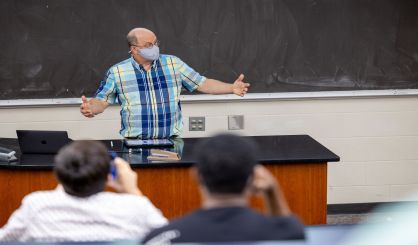
An Andrews University engineering professor has won an award from International Association of Geomagnetism and Aeronomy. Andrews told us more:
Jay Johnson, PhD, professor of engineering, was recently awarded the Shen Kuo Award for Interdisciplinary Achievements from the International Association of Geomagnetism and Aeronomy (IAGA). Scientists within the IAGA study the magnetic and electrical properties of planets. The organization focuses on both geomagnetism, the study of the magnetic field of earth, and aeronomy, the science of the upper atmosphere.
Johnson’s work within the organization has spanned several divisions of the IAGA throughout the years, contributing to sessions on magnetopause transport (2003), magnetosphere-ionosphere coupling (2005), sources and sinks of the plasma-sheet (2009–2012) and magnetotail dynamical processes (2021).
His research stems from the modification of a calculation performed during his time as a post-doctorate at Princeton University. The computation centered on “single particle trajectories of an ion in an Alfven wave.” Over 20 years later, his findings have become foundational for studies relating to the acceleration and heating of ions in the auroral region, magnetosheath and solar wind.
The Shen Kuo medal is awarded every two years, recognizing individuals whose work broadly impacts multiple areas of research, including the fields of geomagnetism, ionosphere, magnetosphere, solar, solar wind and planetary sciences. It is named after a Chinese mathematician, physicist, engineer and poet who lived during the 11th century, remarkable for his interdisciplinary contributions to various fields of knowledge. Nominees for the award must be internationally recognized scientists active in multiple fields of research, supported by scientific bodies outside of the IAGA. Nominations are reviewed by an executive committee.
Johnson notes, “I am delighted and honored to have been selected for this prestigious award. I am particularly grateful to my mentors at MIT (Tom Chang) and Princeton (Frank Cheng) who encouraged me to explore new ideas and for their extraordinary example of impacting multiple areas of research in their own way.”
He voices his appreciation for the several other researchers who worked with him and under him to develop further research based on his initial findings, including Yu Lin (Auburn University), Simon Wing (APL), Eun-Hwa Kim, Peter Damiano and Peter Porazik (Princeton Plasma Physics Laboratory). Johnson explains, “collaborations have been instrumental in broadening the impact of our joint work through theory/data comparison.” Collectively, their work has covered everything from compressions in solar wind to modeling waves in space plasma, electron acceleration, gyrokinetic models and more. The various findings have important implications for both current space missions and existing space systems.
Hyun Kwon, PhD, chair of the School of Engineering, comments, “Dr. Johnson is a great scholar and teacher. As he always strives to be the best in his research, he always works to improve his lecture and classroom experiences.” She goes on to say, “Despite his stellar research and reputation, he is humble and friendly in person. We are so glad to have him as a colleague, a teacher, a neighbor and a friend.”
“I am thankful for the support of Andrews University and the Engineering and Physics departments that have made it possible for me to maintain a strong, active research program,” Johnson expresses. He has also included students in his research agenda, and he thanks all “the talented students at Andrews who have contributed to our research projects.”
In the future, Johnson and his colleagues will continue investigating the dynamics of solar/stellar cycles, including running and analyzing global simulations on Saturn. They have received collaborative funding for further research on the ionosphere, magnetosphere, radiation belts and electron energization.
Founded in 1874, Andrews University is the flagship institution of higher education for the Seventh-day Adventist Church and offers more than 160 areas of study, including advanced degrees. Its main campus is in Berrien Springs, Michigan, but the University also provides instruction at colleges and universities in more than 25 countries around the world.






